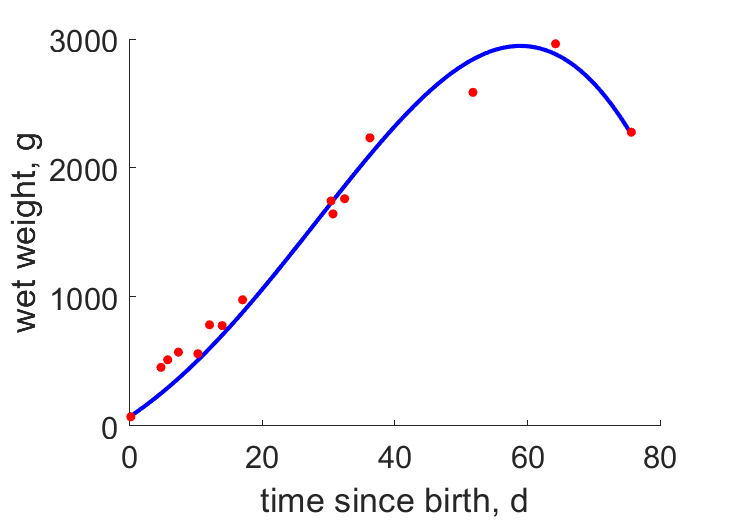Predictions & Data for this entry
| Model: std | climate: MC | migrate: Ml | phylum: |
| COMPLETE = 2.5 | ecozone: MISE, MPSW | food: biCvf, biCic, biCik | class: |
| MRE = 0.022 | habitat: 0iMc | gender: Dg | order: |
| SMSE = 0.002 | embryo: Tnsfm | reprod: O | family: |
Zero-variate data
| Data | Observed | Predicted | (RE) | Unit | Description | Reference |
|---|---|---|---|---|---|---|
| ab | 35 | 35.37 | (0.01061) | d | age at birth | EoL |
| tx | 75 | 74.91 | (0.001142) | d | time since birth at fledging | Warh1974 |
| tp | 225 | 227.7 | (0.01219) | d | time since birth at puberty | guess |
| tR | 1825 | 1825 | ( 0) | d | time since birth at 1st brood | EoL |
| am | 7300 | 7330 | (0.004042) | d | life span | guess |
| Wwb | 70 | 70.61 | (0.008681) | g | wet weight at birth | Warh1974 |
| Wwi | 4000 | 3978 | (0.005532) | g | ultimate wet weight | Warh1974 |
| Ri | 0.005479 | 0.005514 | (0.006267) | #/d | maximum reprod rate | Warh1974 |
Uni- and bivariate data
| Data | Figure | Independent variable | Dependent variable | (RE) | Reference |
|---|---|---|---|---|---|
| tW |  | time since birth | wet weight | (0.08737) | Warh1974 |
Pseudo-data at Tref = 20°C
| Data | Generalised animal | Eudyptes pachyrhynchus | Unit | Description |
|---|---|---|---|---|
| v | 0.02 | 0.03199 | cm/d | energy conductance |
| p_M | 18 | 398.2 | J/d.cm^3 | vol-spec som maint |
| k_J | 0.002 | 0.01645 | 1/d | maturity maint rate coefficient |
| k | 0.3 | 0.3023 | - | maintenance ratio |
| kap | 0.8 | 0.9832 | - | allocation fraction to soma |
| kap_G | 0.8 | 0.8005 | - | growth efficiency |
| kap_R | 0.95 | 0.95 | - | reproduction efficiency |
Discussion
- Reduced relative food intake prior to fledging
- mod_1: v is reduced
- mod_2: Pseudo-data point k is used, rather than k_J; Data set tp and parameter t_R are added, the latter replacing clutch interval t_N. Postnatal T is based on PrinPres1991, see get_T_Aves. See further the revision page, theme puberty
Facts
- Produces a small (99.9 g) and a large egg (120.3 g) (Ref: Warh1974)
Bibliography